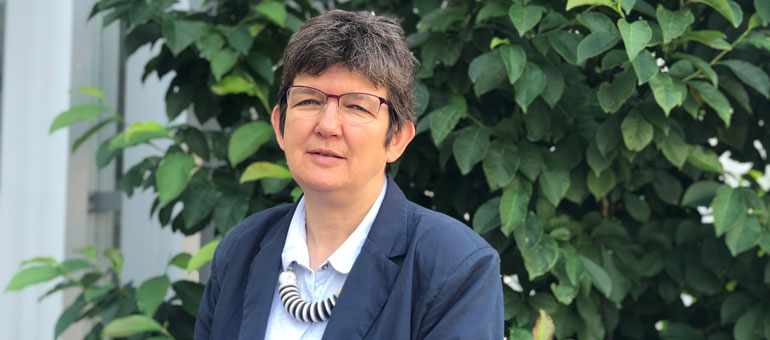What are your responsibilities as Director of Strategic Operations?
I’m responsible for leading the Human Resources (HR) and Information Technology (IT) functions. I am also Secretary to the GAIN Board, so responsible for supporting good governance. In addition, I am a member of the Strategic Management Team, the leadership team in charge of taking collective and strategic decisions on behalf of the organisation.
What motivated you to work at GAIN?
I get a buzz out of helping organisations to be effective at what they do, to think strategically, to have high-quality operations that support that strategy, and to focus on their people as the way to succeed. And I love leading a team within the organisation to help them develop and deliver. GAIN ticks those generic boxes for me. But more specifically, I’m motivated by our unrelenting focus on food systems and I like the fact that we are trying seriously to do things with the private sector. I am not a development specialist, but it does seem to me that we need to take a system approach and to cross the public/private/international non-governmental organisations boundaries if we are going to get real traction on previously intractable problems.
I’m also really motivated by working in a globally-dispersed organisation with teams in different countries and with individuals from different backgrounds, with different technical and professional skills. Helping all of us to work well together is key to maximising our impact. Finally, GAIN is quite “young” as an organisation, so we don’t seem to have some of the baggage you sometimes find in longer-established places. It’s good to have the space that creates, and to work with colleagues - many of whom are young – capable of thinking differently about their world.

Elizabeth Maddison is GAIN Director, Strategic Operations, and is based in the GAIN office in London. © GAIN
What are the most rewarding aspects of your work?
Personally, I really enjoy working with smart people who have a real commitment to their work, who want to find solutions, who can have a really challenging debate about principles and practice whilst also being personally supportive, who are determined to take the best possible decisions. I’m very proud of all the work that the HR team has been doing. We’ve updated the way GAIN approaches some big and important “people” issues, including gender, equality and diversity; we’ve led a big investment in learning and professional development; we’ve developed a new Code of Conduct for staff; we’ve improved the way we recruit and bring staff into the organisation, so that we make sure we find the best talent and support staff to be successful; we’re supporting staff to do their best, all of the time.
I also really enjoy working as a member of the GAIN Strategic Management Team. We are very different individuals, but we work well together. We respect each other’s contributions, we have high expectations of each other, we take our responsibilities seriously and we give each other a lot of mutual support. It can be easy to take that for granted but it’s not universal, so it’s good to pause sometimes to acknowledge it.
Why does diversity at GAIN matter?
Four simple reasons. Firstly, it is the right way to operate. Secondly, there’s lots of evidence that organisations that take diversity seriously in their policies and their practice are happier, more creative and more productive, with lower turnover and absence. Thirdly, as an employer, why would you cut yourself off from talent, instead of looking for it everywhere and nurturing it wherever you find it and whatever form it takes? Fourthly, we work in a diverse world and if we are not reflective of that, where’s our credibility?
Is there any advice you can give to women who want to advance as leaders? Any key points to focus on?
I started my career a long time ago and lots has changed – especially the use of technology. In my first job we had a typing pool, you wrote out what you wanted to say on a piece of paper, it was collected on a trolley, it came back typed several hours later. The idea of connecting simultaneously with colleagues around the world on a screen from your desk and working collaboratively on a document or project in real time would have been fantastical.
But in some other areas, the pace of change has been much slower. A recent media article said that, at the current rate of change, it will be 202 years before the world achieves gender pay parity. That’s shocking.
But underneath these big global changes where lots of us sometimes feel we have no control, I think every individual needs to focus on the everyday, that’s where we can all make a difference. I would urge everyone – male or female – to try to do five things. Firstly, base your decisions on the best evidence you can get. Secondly, try to be kind. Thirdly, think about women leaders you admire and how they work. Think Michelle Obama going high when they go low, or Jacinda Arden holding up her country in the face of the gun attacks on Mosque worshippers. In my case, I had a woman boss for several years in a difficult job. However challenging the conversation, I left her office feeling better than when I went in. Fourthly, listen to your mother. My mother gave me the two best pieces of management advice I ever had – “if a job’s worth doing, it’s worth doing well”; and “you get out of something what you put in to it”. Finally, listen to your daughter(s). They will live with the legacy of your actions and face every day the reality of the kind of sweeping changes I mentioned at the start of my answer. They will keep you grounded – and looking forwards.